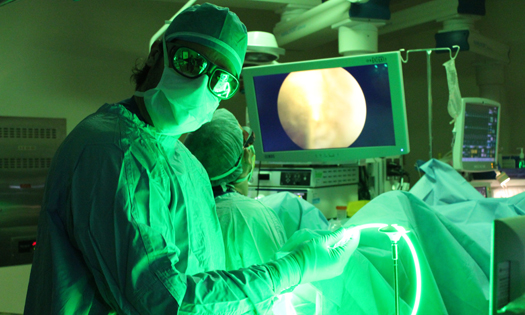
Dr. Dean Elterman performs minimally invasive prostate surgery at Toronto Western Hospital using the GreenLight Laser. (Photo: UHN)
For urologist Dr. Dean Elterman, when the GreenLight Laser arrived at Toronto Western Hospital (TWH) last December, it was like he was getting a Christmas present.
Today, Toronto Western Hospital is the only academic teaching hospital in the city to provide this advanced surgical treatment.
"Most of us likely cross our legs and wait until the subject changes." -Gary Klein, first patient at TWH to receive GreenLight Laser surgery.
The GreenLight Laser is a minimally invasive, out-patient procedure to treat enlarged prostates in men.
As men age, the prostate gland grows in size, a process also known as benign prostatic hyperplasia (BPH). This may create blockage of urine flow causing bothersome urinary symptoms such as frequent urination, weak or slow urine stream, and waking up at night.
If left untreated, serious bladder and kidney damage could happen.
One of most common health conditions
Elterman, a men's health expert who teaches other urologists how to use the GreenLight Laser, is one of a handful of surgeons in Ontario trained in the use of this tool, which works by vaporizing the prostate tissue.
He said BPH is one of the most common health conditions effecting men as they get older, noting 50 per cent of men age 50 and 70 per cent of men age 70 will have an enlarged prostate.
"Not every man with an enlarged prostate will need surgery, but for those who do, laser treatment is an excellent option, even for those with a very large prostate," Elterman said.
"The advantage of the GreenLight Laser is that men can go home the same day as surgery, with virtually no operative blood loss even while remaining on their blood thinner medications," he continued.
When medication fails
Gary Klein, the first patient at TWH to receive GreenLight Laser surgery, was experiencing the typical symptoms associated with an enlarged prostate.
Even though he was on medication, he was always conscious about needing to be near a bathroom and was waking up numerous times in the night to urinate.
"I thought I was adequately controlling the problem with medication. But it turns out I wasn't and if I had not had the surgery I might have easily caused irreversible damage to my bladder and kidney," said Klein. "It was gratifying to be treated with the GreenLight Laser. The surgery itself was remarkable, there was a very small amount of pain and I recovered quite quickly."
Open surgery vs. lasers
Transurethral resection of the prostate (TURP) and open simple prostatectomy for larger sized prostate glands are the traditional methods of surgically treating enlarged prostates. Unlike laser surgery, TURP and open simple prostatectomy have a number of side-effects such as pain, bleeding, prolonged catheterization and longer hospital stays.
Before surgery, Klein considered himself to be like most men when it comes to talking about the prostate.
"Most of us likely cross our legs and wait until the subject changes," he said.
Today, he is almost symptom free and has reached out to male family members and friends to help reduce their anxiety about the topic.
Being able to offer patients like Klein laser surgery is extremely important to Elterman. As a strong advocate for improving men's health, he wants more men to know that it is important not to ignore or be embarrassed about tackling their health problems.
"I see many men who put off taking care of their health," said Elterman. "As a urologist, I believe this area of medicine puts me in a unique position to really engage men in their health and to provide them with gender specific care."
"Coming in to speak about their bothersome urinary symptoms opens the door to discuss all sorts of topics such as sexual, cardiovascular and mental health. I know the GreenLight Laser is a major step forward to put men's minds at ease when it comes to surgically treating their symptoms and ultimately to improve their quality of life," he said.
